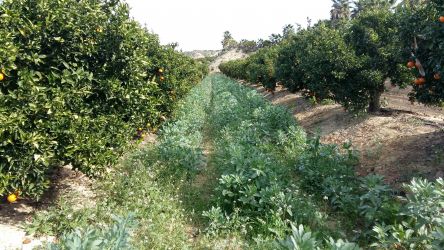A Diverfarming project study compares the environmental footprint and the economic performance of traditional mandarin monocropping as opposed to growing mandarin intercropped with herbaceous crops and the use of deficit irrigation
The transformation towards intensive agriculture has led to agricultural practices in Europe that have centred on increasing the yield and reducing costs in recent decades, and which involve a major dependence on external sources of agrochemicals and energy. These intensive monocropping systems have generated biodiversity losses, water contamination, and high rates of greenhouse gas emissions, as well as degrading the soil and reducing the ecosystem services.
 Faced with this situation, the European Diverfarming project has trialled the diversification of crops throughout the European Union, seeking the best practices to combine crops and focusing on reducing inputs to find the best options to preserve the sustainability of the systems and increase the resilience of the European agricultural sector. To do so, it is also necessary to know the impacts of these practices both at environmental as well as economic level.
Faced with this situation, the European Diverfarming project has trialled the diversification of crops throughout the European Union, seeking the best practices to combine crops and focusing on reducing inputs to find the best options to preserve the sustainability of the systems and increase the resilience of the European agricultural sector. To do so, it is also necessary to know the impacts of these practices both at environmental as well as economic level.
With the aim of knowing the environmental footprint and the economic performance of the introduction of herbaceous crops among the alleys of the mandarin trees using controlled deficit irrigation in a mandarin grove located in the Region of Murcia, a team of researchers from the Universidad Politécnica de Cartagena have carried out a life-cycle assessment of the crop and an evaluation of the costs and income of the farm for the three years that the experiment in this case study was carried out.
Although the growing area increased with the introduction of the herbaceous crops (in this case purslane, cowpea, broad beans, and a barley-vetch mix), no detrimental effects occurred in terms of exhausting resources, acidification, or global warming. Therefore, the practice of intercropping did not cause additional contamination or other environmental impacts. This, in addition to the results of the increase in nitrogen and organic carbon content and in the soil and the reduction in erosion and run-off makes the introduction of herbaceous crops in the alleys of the mandarin trees a good sustainable environmental option to cope with the current challenges of the sector.
In economic terms, the financial security of the agricultural community also becomes a key element for successfully adopting diversified systems. This study highlights, through the economic assessment, that intercropping can lead to an increase in production costs, mostly related with a greater demand for labour in comparison with monocropping. However, the study also concludes that “the correct choice of intercropping practices can bring economic advantages”. The results showed that the mandarin crop with purslane and broad beans as intercrops could be profitable and reduce the risk for the grower against volatile prices in the main crop.
In this way, considering all the potential environmental and economic benefits of intercropping practices, these systems arise as a tool to move towards more sustainable and profitable agricultural systems. The valorisation of agricultural products that are more respectful to the environment on the part of consumers and the backing of public funding (e.g., direct help to growers who introduce intercropping) are key aspects to drive the adoption of these practices.
Diverfarming is a project financed by the Horizon 2020 Programme of the European Commission, within the challenge of “Food Security, Sustainable Agriculture and Forestry, Marine, Maritime and Inland Water Research and the Bioeconomy”, under agreement 728003. It counts on the participation of the Universities of Cartagena and Córdoba (Spain), Tuscia (Italy), Exeter and Portsmouth (United Kingdom), Wageningen (Netherlands), Trier (Germany), Pecs (Hungary) and ETH Zurich (Switzerland), the research centres Consiglio per la ricerca in agricoltura e l'analisi dell'economia agraria (Italy), the Consejo Superior de Investigaciones Científicas (Spain) and the Natural Resources Institute LUKE (Finland), the agrarian organisation ASAJA, and the companies Casalasco and Barilla (Italy), Arento, LogísticaDFM and Industrias David (Spain), Nieuw Bromo Van Tilburg and Ekoboerdeij de Lingehof (Netherlands), Weingut Dr. Frey (Germany), Nedel-Market KFT and Gere (Hungary) and Paavolan Kotijuustola and Polven Juustola (Finland).










